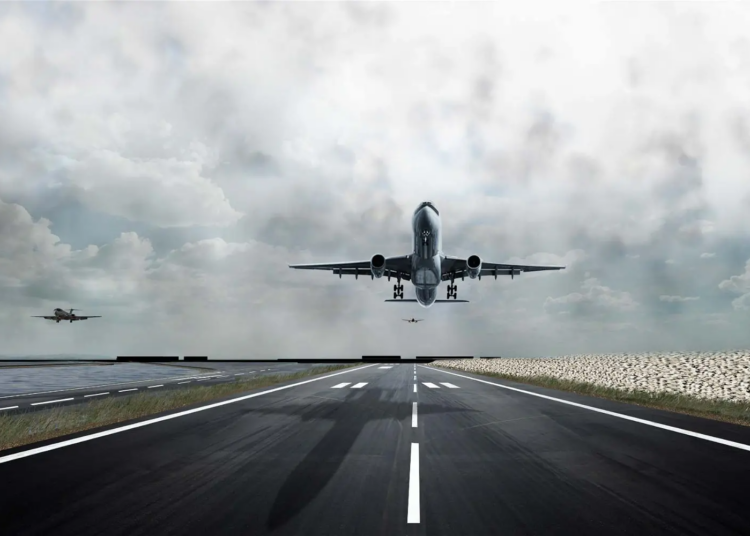Currently, the West Africa sub-region aviation industry has been thrown into another set of turmoil after Nigeria‘s neighbour, Niger Republic announced its decision to shut it airspace to flight operations in fear of external invasion by forces from the Economic Community of West African States (ECOWAS).
The shutdown of the airspace was due to the demand of ECOWAS that military junta that overthrew democratically elected government to restore President Mohamed Bazoum or risk military action from member states.
As a result, there have been diversions, U-turns and cancellations have dealt a devastating blow on international travel across Africa especially flight to Europe from Nigeria as Europe-bound flights had to fly extra hours to an alternative route before they could connect their destinations.
According to aviation experts, with Niger Republic adding to Sudan and Libya, a relatively unstable country that has shut its airspace since 2011, foreign airlines now fly over 2,600 miles from western Niger to the Red Sea to connect their destination routes.
For instance, RwandAir from London diverted to Accra to refuel before proceeding to Kigali because the fuel planned for the flight could not take them to Kigali after avoiding the Niger airspace.
Also, airlines such as British Airways BA56 from Johannesburg that were already in the air before the Nigerien junta announced the shutdown flew as far as Chad before turning back to its starting point. It was operated by an Airbus A380 “SuperJumbo”, with space for nearly 500 passengers.
Flight BA64 from Nairobi to Heathrow took a similar path, turning back after three hours to return to the Kenyan capital.
British Airways flight BA58 from Cape Town to London Heathrow was also diverted via Lagos. It took off as normal early on Sunday evening and followed a normal track over Namibia, Angola, Gabon, Cameroon and Nigeria.
Other flights between the UK and South Africa have being re-routed or diverted to take on extra fuel or have returned to their starting points as a result of the closure.
Speaking to LEADERSHIP, managing partner, Aglow Aviation Support Services Limited, Tayo Ojuri, said the shutdown is the reality of the time that will definitely increase cost of traveling as foreign airlines will burn more fuel.
According to him, the same applied during the Russia invasion of Ukraine and the Kremlin shutdown its airspace and with 60 per cent of Europe bound flight from Asia going through Russia airspace, they had to find an alternative.
Ojuri said, „There will be antecedent increase in the price of tickets at certain locations and apart from prices, that is where you as an airline is strategic in activating code share because if you see that you are not as full on that route, why deploy three flights if within the same alliance, I can transfer my passengers to you and it‘s all in the interest of economy of scales.
„Don‘t forget as well that with this longer routes it brings a to the front burner an issue International Air Transport Association (IATA), is trying to address before 2050 and that the carbon emissions issue.
„Aviation is the worst culprit of polluting the environment and they are finding ways to reduce the carbon emissions and if you fly longer, we are adding to it.“
Ojuri, speaking further, said the Niger crisis was a social political issue that cannot be resolved by the aviation stakeholders except a political solution.
‚‘This is not in our hands but we always ensure that it‘s resolved in a most amicable manner and fast it‘s something we have to live with. Before Niger Republic, Sudan was there and Libya wasn‘t a stable state so we are looking at 2600km and depending on the aircraft, it takes an average of 2 to two and half hours to cross to an alternative route. That‘s the challenges we are faced with and I do say that it‘s the reality of the time and I will say we are born for a time such as this,“ he told LEADERSHIP.
On his part, the president, Association of Foreign Airlines and representatives in Nigeria, Kingsley Nwokeoma, said even when foreign airlines are still battling with trapped fund, the closure of Niger’s airspace added to their miseries.
He, however, stated that connecting flights to Europe and US will be more expensive as flight options will be limited.
“We are already grappling with foreign exchange scarcity and trapped funds, which have increased the cost of fares. This will only be more trouble for us and I hope the issue will be resolved as soon as possible,” Nwokeoma said.
The chief executive officer of Mainstream Cargo Limited, Seyi Adewale, said there will certainly be an additional cost on the airlines, especially relating to fuel expenses, arranging new flight authorisation with other countries if necessary, and reworking slot schedules.
“My thoughts are that this is ‘force majeure’ that will hopefully pass away soon,” he added.
He said the affected airlines need not pass this to an already overstretched Nigerian passengers that are paying high airfares.
“I strongly believe that these airlines, especially those plying Europe/US routes, already make huge margins, although slightly or prior tamed by restrictive fund repatriations that are easing out,” Adewale said.
Another aviation analyst, Capt. Samuel Caulcrick, said airlines have the option of going through Chad to Tripoli before approaching Algeria.
“Since Mali and Burkina Faso are with them, that means you have to go all the way to Dakar before going up again. You can’t go to Sudan because there is war. It takes more time, more fuel burn.
If you have to go through Dakar towards Guinea Bissau before going up again, you have to enter Senegal, from Senegal to Morocco that could take another one hour. Normally it takes us three hours to cross the desert, now it will take us four hours,“ he stated.





